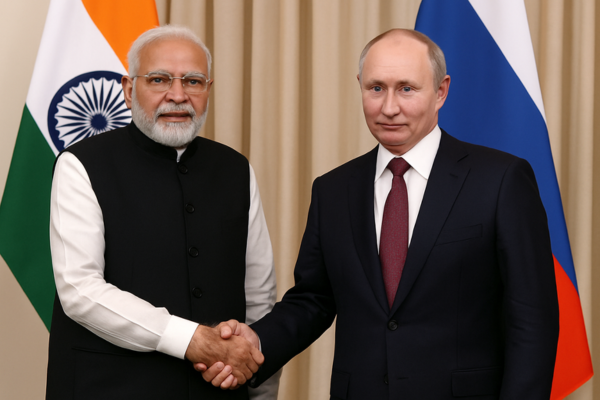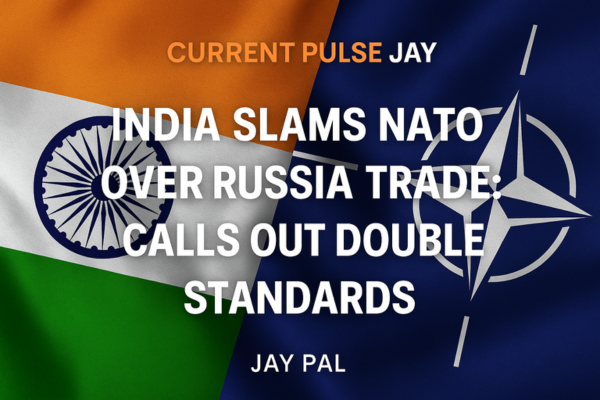Introduction
India Slams NATO Over Russia Trade In a bold diplomatic move, India has strongly criticized NATO for its warning against continuing trade with Russia amid ongoing Western sanctions. Terming NATO’s stance as “hypocritical” and an example of double standards, New Delhi reaffirmed its position on maintaining strategic autonomy and defending its national interests. This development has reignited debates on global trade fairness, Western pressure tactics, and India’s evolving role as a key geopolitical player.
Table of Contents
What Triggered the Controversy?
The controversy erupted when NATO issued an advisory, warning countries, including India, to restrict trade with Russia. The warning was framed as part of Western efforts to tighten economic sanctions on Moscow following the Ukraine conflict. NATO’s statement implied that nations engaging with Russia could face reputational and strategic consequences.
However, India reacted sharply, questioning NATO’s credibility and accusing it of selective morality in international trade.
India’s Official Response
The Ministry of External Affairs (MEA) in New Delhi categorically stated:
“India will continue to pursue trade and energy relations based on national interest. Lectures from organizations with a history of selective interventions are uncalled for.”
Key Points of India’s Response:
- Strategic Autonomy: India emphasized that it will not succumb to external pressure when it comes to economic decisions.
- Energy Security: Russia remains a major supplier of crude oil and fertilizers to India, helping stabilize prices domestically.
- Historical Context: India highlighted the West’s own dependence on Russian energy in the past and accused NATO of double standards.
Why Does This Matter for India?
India’s firm stance holds significance for multiple reasons:
1. Economic Considerations
- Oil imports from Russia offer discounted rates, helping India keep inflation under control.
- India-Russia trade hit $65 billion in FY 2024, making Russia a critical partner in energy and defense.
2. Geopolitical Balancing
- India is part of QUAD (with US, Japan, Australia) but maintains deep ties with Russia (a key defense supplier).
- By resisting NATO’s pressure, India signals independent diplomacy rather than bloc alignment.
3. Domestic Politics
- The Indian government projects such decisions as defending sovereignty, a narrative that resonates with voters.
The NATO Hypocrisy Debate
India’s criticism revolves around NATO’s selective application of principles:
- Western nations imported Russian gas even after sanctions (e.g., Germany’s LNG deals).
- The US continues to trade certain non-energy goods with Russia indirectly.
- NATO members have often intervened militarily without UN approval, raising questions about legitimacy.
India argues that if trade with Russia funds war, the same should apply to Western exceptions.

The NATO Hypocrisy Debate: India Slams NATO Over Russia Trade
The global geopolitical landscape is heating up, and the NATO hypocrisy debate has taken center stage after India slams NATO over Russia trade in multiple international forums. As the West continues to criticize nations like India for maintaining economic ties with Russia, India has called out the double standards of NATO countries that quietly continue trading with Moscow despite their sanctions rhetoric.
India Slams NATO Over Russia Trade – Exposing the Double Standards
When India slams NATO over Russia trade, it is not just a diplomatic move—it’s a strong statement against what New Delhi sees as blatant hypocrisy. NATO members have repeatedly pressured India to reduce its energy imports from Russia. However, reports reveal that several NATO nations are still purchasing Russian energy, technology, and commodities through indirect channels. This contradiction fuels the NATO hypocrisy debate, questioning the legitimacy of Western moral superiority.
India’s Strategic Autonomy and the NATO Hypocrisy Debate
India slams NATO over Russia trade as part of its policy to maintain strategic autonomy. India argues that Western nations prioritize their economic security even as they expect other countries to make sacrifices. By continuing business with Russia in sectors like LNG and rare earth minerals, NATO members undermine their own sanctions narrative. India has highlighted these inconsistencies during G20 discussions and other diplomatic engagements, reinforcing the NATO hypocrisy debate on global platforms.
Energy Security: Why India Slams NATO Over Russia Trade
One of the main reasons India slams NATO over Russia trade is energy security. India, as a rapidly growing economy, cannot afford to disrupt its oil supply. Yet NATO nations, who lecture India on sanctions, have themselves been found sourcing Russian energy via third parties. This selective outrage forms the crux of the NATO hypocrisy debate, making global South countries question Western credibility.
NATO’s Quiet Deals and India’s Loud Rebuke
Despite harsh sanctions rhetoric, reports suggest that NATO countries still allow imports of Russian goods like fertilizers, metals, and even energy products. This is why India slams NATO over Russia trade repeatedly, arguing that moral posturing cannot hide economic pragmatism. By pointing out these hidden trade links, India adds weight to the growing NATO hypocrisy debate, which could reshape future diplomatic alignments.
Global Reactions as India Slams NATO Over Russia Trade
The moment India slams NATO over Russia trade, the world listens. Many nations in Asia, Africa, and Latin America share India’s frustration. They too face Western pressure to isolate Russia while NATO members bend their own rules. This widening gap between Western rhetoric and reality is central to the NATO hypocrisy debate, signaling a potential shift toward a multipolar world order.
Key Takeaways in the NATO Hypocrisy Debate
- India slams NATO over Russia trade to highlight Western double standards.
- NATO nations quietly maintain economic links with Russia despite sanctions.
- Strategic autonomy and energy security drive India’s stance.
- The NATO hypocrisy debate is reshaping global diplomacy.
Global Reaction
- Russia welcomed India’s stance, calling it a sign of maturity in global politics.
- China expressed support, seeing it as resistance to Western dominance.
- Western media criticized India, warning that closer India-Russia ties could strain India-US relations.
Implications for Global Trade
- Emerging Markets Empowered: India’s resistance may inspire other developing nations to defy Western trade restrictions.
- Shift in Supply Chains: Countries like India, China, and Brazil could lead an alternative trade system.
- Risk of Sanctions: The US and EU could consider secondary sanctions, but this remains unlikely due to India’s strategic importance.
India’s Long-Term Strategy
India seems committed to:
- Diversifying energy sources, reducing dependency over time without abrupt policy changes.
- Strengthening BRICS and other non-Western trade alliances.
- Maintaining ties with the West while asserting independence.
Public Sentiment in India
Social media reactions reflect national pride in India’s bold stance:
- Hashtags like #IndiaSlamsNATO and #StrategicAutonomy trended on X (Twitter).
- Analysts and influencers praised India for standing up to global hypocrisy.
Conclusion
India’s sharp response to NATO’s warning over Russia trade marks a significant chapter in global diplomacy. By calling out double standards, India has asserted itself as a sovereign voice in an increasingly polarized world. As the Russia-Ukraine war drags on, India’s ability to navigate these turbulent waters without compromising its interests will define its future as a major power.

